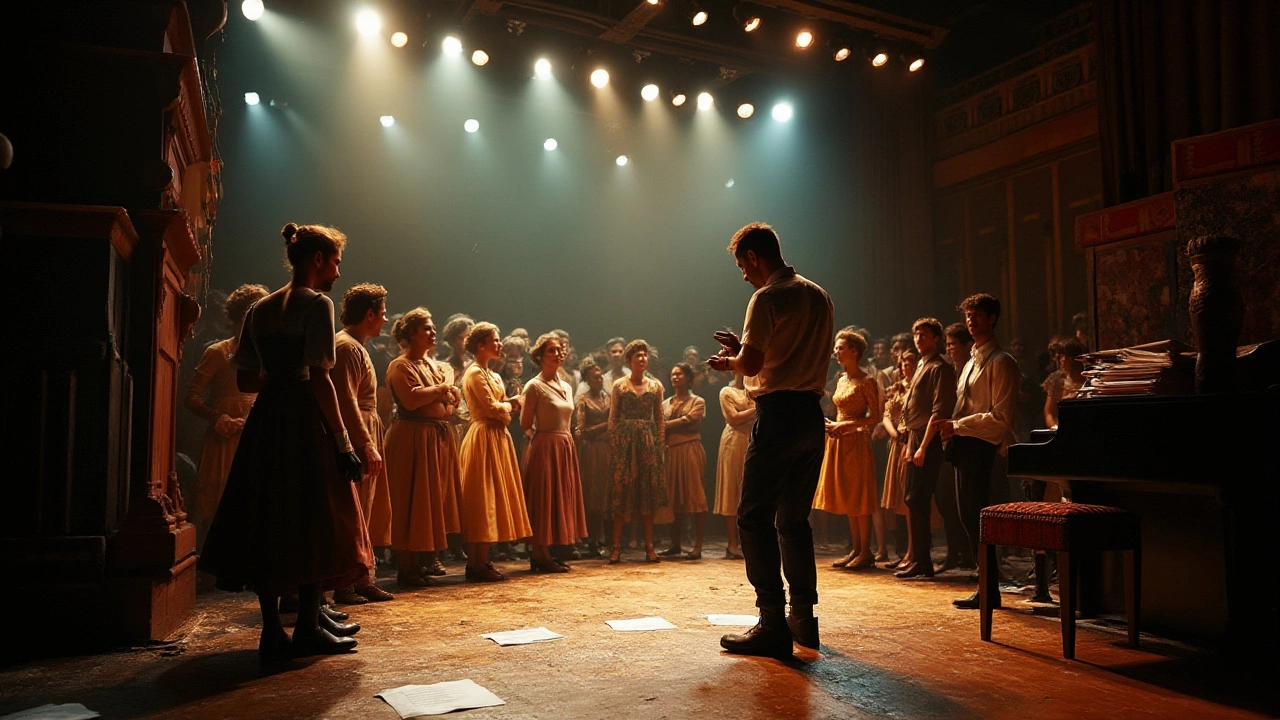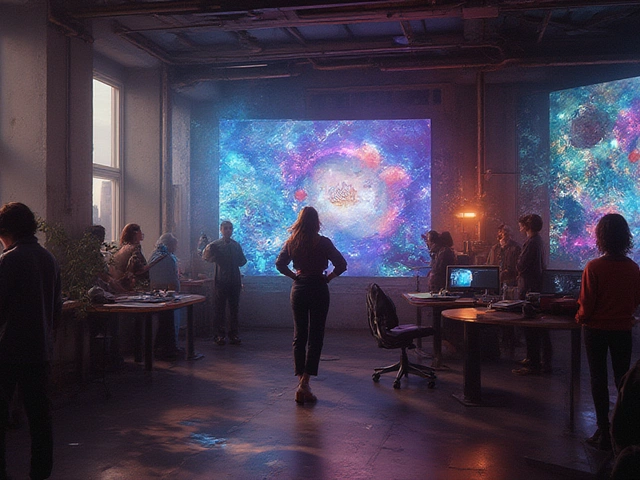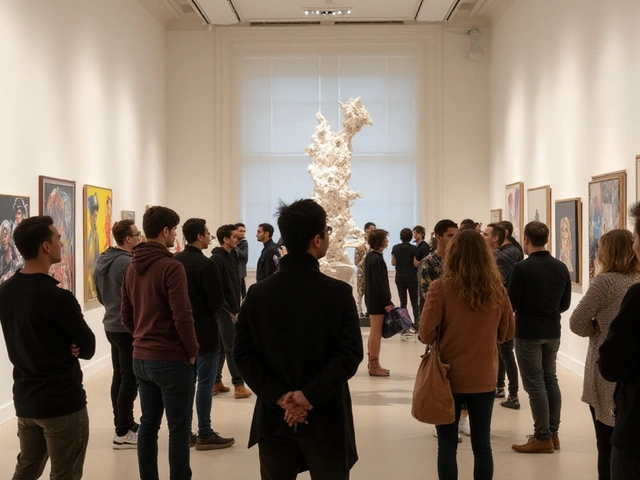Musicals have a unique way of weaving themselves into the very fabric of popular culture. They're vibrant tapestries of song, dance, and drama that capture the imagination of audiences worldwide. But what truly makes one stand out as the best? Is it the timeless music that echoes through the years, or the unforgettable characters who linger in our hearts long after the curtain falls?
As we dive into this exploration, we'll visit some of the most iconic productions that have graced the stage, both past and present. We'll unravel the elements that elevate a musical from mere entertainment to an unforgettable experience. And we'll ponder how these magical creations impact us, reflect societal changes, and continue to thrive in the ever-evolving world of arts and culture.
- Defining a Top-Tier Musical
- Iconic Productions Through the Decades
- Elements of a Standout Musical
- The Impact of Musicals on Culture
Defining a Top-Tier Musical
When it comes to determining what makes a musical theater production truly exceptional, the discussions often revolve around several key components. These components are like the notes of a symphony, each crucial to creating a harmonious and captivating experience. Firstly, the storyline plays a pivotal role. A great musical will have a plot that resonates universally, weaving a fabric that's both emotional and intellectually engaging. Whether it’s a tragic love story or a comedic romp, the narrative must strike a chord, delving into the depths of human experiences that are relatable across ages and cultures.
Another cornerstone is the music, which breathes life into the narrative and is often the most memorable aspect of any production. Composers who pen unforgettable scores such as Stephen Sondheim, Andrew Lloyd Webber, or Lin-Manuel Miranda create melodies that haunt and inspire, leaving audiences humming tunes for days. The lyrics serve as an extension of the dialogue, providing insight into characters’ inner thoughts and moving the story forward. When both music and lyrics are crafted with brilliance, they enhance the overall storytelling experience, turning an already engaging narrative into a powerful emotional journey.
Then there are the performances. The actors who bring the characters to life must be a perfect fit for their roles, able to convey the nuances and depths of the story through song, dance, and dramatic acting. Their synergy on stage should be palpable, creating magic during each performance. A top-tier musical demands not only skill but also chemistry among its cast members, as this extends the story from the pages of the script to the hearts of the audience.
A great production also pays attention to the elements of design—set, costumes, lighting, and sound. A meticulous set design can transport audiences to another world, while costumes add depth to characters, signaling everything from historical periods to personality traits. Lighting sets the mood for each scene, and effective sound design ensures that every word and lyric is crystal clear.
According to cultural critic Ben Brantley, "A truly great musical leaves you forgetting the world outside the theater, completely absorbed in the story being told before you." This encapsulates the transformative power of a brilliant production, an element that is vital when considering what sets a musical apart.
Moreover, sometimes it's the cultural impact and timelessness that cement a musical's place in history. Shows that reflect societal changes or challenge norms attract critical acclaim and love from audiences. Productions like 'Rent' highlighted the struggles of New York City’s bohemian scene, while 'Hamilton' reimagined American history with a modern twist, both leaving undeniable marks on cultural landscapes. These narratives, regardless of the time period they reflect or the style they employ, resonate because they tell stories with a relevance that echoes through the annals of time.
Of course, while these elements individually contribute to what makes a musical excellent, their synergy is what defines a top-tier production—one where the music, story, design, and performance harmoniously intertwine, creating an experience that transcends the boundaries of traditional theater. Such a musical not only entertains but also leaves lasting impressions, inviting endless discussions and countless revisits to the magical worlds they create. In short, a truly great musical offers an escape and an insight, a burst of emotion and a touch of the sublime, all packed into an unforgettable evening at the theater.
Iconic Productions Through the Decades
The world of musical theater has witnessed countless legendary productions that have defined eras and captured audiences' hearts. Each decade brought with it a distinct flavor, a set of shows that not only entertained but also reflected the times they were part of. Take for example the golden era of the 1940s and 1950s, when musicals like Rodgers and Hammerstein's 'Oklahoma!' and 'South Pacific' dominated the scene. These shows broke new ground by integrating music, narrative, and dance to tell compelling stories that resonated deeply with audiences.
Moving into the 1960s, Broadway saw a shift towards more revolutionary themes with productions such as 'West Side Story' and 'Hair.' These plays challenged societal norms and took a raw, sometimes confrontational approach to storytelling. The music itself often mirrored the cultural and political changes happening at the time, with dynamic choreography that left audiences breathless. Stephen Sondheim began to emerge during this period, reshaping what musical theater could express emotionally and intellectually.
The 1980s introduced the era of the mega-musical, typified by grandiose sets and epic narratives. Shows like Andrew Lloyd Webber's 'The Phantom of the Opera' and 'Les Misérables' drew audiences from around the globe, cementing their status as timeless. This was a time when productions pushed technical boundaries and emphasized rich, evocative scores that highlighted grand stories. The expectation for spectacle became a norm, setting a new benchmark for musicals everywhere.
The 1990s continued this trend of larger-than-life productions, with Disney entering the stage with 'Beauty and the Beast' and 'The Lion King.' These shows were a blend of innovative visual artistry and family-friendly narratives, while still retaining a level of sophistication that appealed to adults. Meanwhile, more intimate productions like 'Rent' harnessed the raw energy of rock to tell gritty, authentic stories about youth, struggle, and community in the face of adversity.
Enter the new millennium, and musicals began to reflect a wider diversity of voices and stories. Shows like 'Hamilton' broke barriers entirely, marrying hip-hop with historical narrative to create an exhilarating blend that became a cultural phenomenon. Lin-Manuel Miranda's work not only reinvented what musicals could sound like but also whose stories were being told. As David Cote of Time Out New York once said,
'Hamilton is the story of America then, as told by America now.'It is this diversity and relentless innovation that keeps musicals at the forefront of engaging and thought-provoking entertainment.

Elements of a Standout Musical
Crafting a standout musical is akin to creating a masterpiece; it involves a delicate balance of creativity, precision, and understanding of the audience's pulse. At the heart of any unforgettable musical lies its music and lyrics. The melodies must be enchanting, capable of evoking a spectrum of emotions, from deep sorrow to pure joy. Think of musical theater gems like "Les Misérables," whose sweeping tunes have captured audiences for decades. The lyrics, meanwhile, must weave seamlessly into the narrative, with the power to crystallize the story's essence in the minds of the audience. When music and storytelling are in harmony, they create an indelible theatrical experience.
Another pillar of any great musical is the storyline. It's the narrative backbone that guides the audience through a journey, often filled with twists, emotional highs, and contemplative lows. This storyline must resonate universally while maintaining individuality, which is why shows like "Hamilton," with its innovative retelling of American history, have taken the world by storm. A standout story not only entertains but also challenges perspectives and inspires thought, leaving audiences pondering long after the final bow. Characters, too, play a pivotal role. They must be compelling, complex, and most importantly, relatable. Audiences should feel a deep connection, whether they're rooting for the protagonist's success or lamenting a tragic fall.
Next is the visual and directorial finesse that ties the entire production together. From costumes to sets, every element contributes to the creation of a world that audiences can lose themselves in. Directors have the unique responsibility of bringing the script to life—ensuring that on-stage action translates the playwright's vision with clarity and creativity. Great directors pay attention to the smallest details, crafting each scene as if it were a painting, each frame a composition that adds depth and layers to the story. In shows like "The Phantom of the Opera," it’s this meticulous direction and elaborate staging that draws viewers into the haunting yet beautiful world it presents.
The legendary composer Stephen Sondheim once stated, "Musicals are plays, but the last collaborator is your audience, so you've got to wait 'til the last collaborator comes in before you can complete the collaboration."
Finally, the performance itself can make or break a musical. The energy, passion, and dedication of the cast must be palpable. Actors, through their talent and commitment, have the power to elevate a good show to greatness. Live performance is an ephemeral art form, making each viewing a unique experience. In celebrated productions such as "The Lion King," it's the astounding performances that breathe life into the intricate puppetry and striking visuals, cementing its status as an icon of Broadway.

The Impact of Musicals on Culture
The world of musical theater has long thrived as a vibrant mosaic that reflects and influences society in profound ways. From the roar of audiences at Broadway to the intimate stages of West End, musicals have sparked conversations and invigorated the arts. They often serve as a mirror, reflecting pivotal societal shifts and cultural moments that resonate with millions around the globe. Musicals like "Hamilton" challenged traditional narratives by intertwining history with contemporary music, thus creating a dynamic storytelling form that both educates and entertains. This production ignited discussions on representation, casting, and the retelling of history that have extended well beyond theater audiences.
But the influence of musicals goes far beyond just storytelling: their capacity to spotlight social issues is unparalleled. Shows like "Rent" tackled the AIDS crisis with unflinching honesty, shedding light on the struggles and humanity of those affected. These themes were not simply preserved within theater walls; they sparked broader cultural reflections and understanding. The musical "Chicago," with its satirical take on justice and media sensationalism, continues to maintain relevance amid ongoing discussions about these very elements in society today.
"A musical isn’t just a break from reality; it's often a deeper look at the realities we live,"] discusses theater historian Marian Orentes. “The layers of music and storytelling help us to process and often reframe those realities."
As musicals evolve, they've embraced new technological innovations and narrative techniques. From the intricate puppetry of "The Lion King" to the spellbinding visual effects in "The Phantom of the Opera," technological advancements have enhanced storytelling, making musicals more immersive than ever. In addition to the technological enhancements, the accessibility of musicals has broadened with platforms like Disney+ and other streaming services, bringing these performances to living rooms worldwide. This increased accessibility not only widens the audience base but also extends the cultural reach of these productions.
The impact of musicals on popular culture can also be charted through their influence on fashion, language, and even advertising. Iconic costumes from productions often set fashion trends, while catchy musical phrases frequently make their way into everyday lingo. The exchange goes both ways, as popular music and culture increasingly infuse their beats and styles into new productions, reflecting the ever-adapting landscape of musicals.







